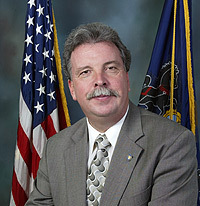






Pennsylvania Online Poker Bill IntroducedOnline Gaming To Be Discussed In State On April 16 |
|
|
 The state of Pennsylvania has before flirted with legislation that would allow casinos already in the state to offer gambling on the Internet to those physically within Pennsylvania’s borders, and on Wednesday this year saw the state’s latest attempt.
The state of Pennsylvania has before flirted with legislation that would allow casinos already in the state to offer gambling on the Internet to those physically within Pennsylvania’s borders, and on Wednesday this year saw the state’s latest attempt.
State Rep. John Payne introduced House Bill 649. No text has yet been made available online, but the proposal sounds very similar to past efforts and online gaming proposals that other U.S. states have been discussing as well. Payne’s bill would set a 14-percent tax on Internet gaming operators, in addition to charging them a $5 million license fee. The bill would apparently preclude small business owners from starting their own online gaming business. Online gaming is designed for big business.
Payne is the House Gaming Oversight Committee Chairman, so a bill from him is significant.
“Right now millions of Americans, including Pennsylvanians, participate in illegal online gaming where no regulation currently exists,” Payne said. “By enacting effective state policy, we can help curb the illegal market while ensuring strong safeguards are in place to protect consumers.”
U.S. law enforcement has enforced the 2006 Unlawful Internet Gaming Enforcement Act on offshore online gaming operators in the past, but not against poker players themselves. Many offshore, unregulated sites still cater to Americans despite law enforcement demonstrating that it will enforce the law, though it doesn’t do so often. The most notable time was in April 2011, dubbed Black Friday, when the largest poker sites left American cyberspace.
Three states—Nevada, Delaware and New Jersey—have their own regulated sites, though some people in all three states most likely still access offshore gambling sites.
Optimistic estimates peg Pennsylvania’s online gaming industry at eventually reaching $300 million annually. Revenue projections in each of the U.S. states with regulated online gaming have so far fallen short of their original estimates.
The most egregious inflation was New Jersey, when Gov. Chris Christie estimated $1 billion in revenue from online gaming in year one. The state saw less than $130 million in year one.

John Payne
“The implementation of legalized online gaming in Nevada, New Jersey and Delaware demonstrates the technologies exist to regulate Internet gaming safely and effectively,” he added. “This legislation is the first step toward ensuring future growth as the industry expands.”
The House Committee on Gaming Oversight is scheduled to hold a hearing to discuss Internet Gaming and Mobile Gaming on April 16.
Las Vegas Sands Corp., the business of Sheldon Adelson, has a casino in Pennsylvania, and so his political capital in the state might be enough to kill any Pennsylvania online gaming bill. Adelson is also pursuing efforts to ban online poker nationwide.
Adelson’s presence in Pennsylvania is enough of a reason to not remain too optimistic about Pennsylvania legalizing Internet gaming sites.
